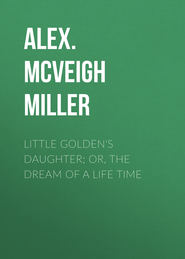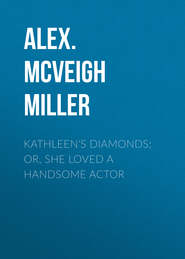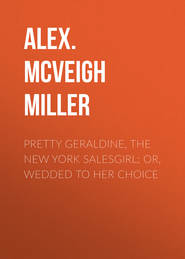По всем вопросам обращайтесь на: info@litportal.ru
(©) 2003-2024.
✖
Laurel Vane; or, The Girls' Conspiracy
Настройки чтения
Размер шрифта
Высота строк
Поля
She tore it open and ran her eyes quickly over the contents, while her husband watched her expressive face with deep anxiety.
She finished at last, and turned her fond, smiling blue eyes upon Cyril's questioning face.
"All goes well," she said. "They have not discovered my charming little plot yet. Papa and mamma have written, and they are both as well as usual. Clarice answered their letters, and imitated my hand and style so well that they were completely imposed upon."
"Clarice must be a clever maid," said Cyril.
"She is," said Beatrix. "Her education is far above that of her class generally. She was very valuable to me. I hated to part with her, but I was obliged to send her to Eden to keep up appearances, answer mamma's letters, and keep Laurel Vane up to her part."
"And when is this farce to end?" asked Cyril.
"Oh, not for several months yet, if I can help it," answered the pretty bride, looking frightened at the very idea.
"But why keep it up so long? I cannot understand your reluctance to have your parents learn the truth, love. They cannot forbid the bans now, for we are united as fast as Church and State can bind us," said Cyril Wentworth, who had an honest, open nature; and now that he had won his bonny bride, longed to have the whole world hear what a prize he had won.
"I have a secret reason, Cyril, darling," said the fair bride, twining her arms about his neck, and looking up in his face with sweet, shining eyes. "If Laurel plays her part well and I can keep our marriage a secret a few months, some great good fortune will come to us, Cyril. If not—if it is all found out sooner—why, then," with a little contented sigh, "I shall still have you, my dear. Fate cannot take you from me!"
"I am dying of curiosity, darling," laughed Cyril Wentworth.
"No matter. You shall not hear one word till the time is up," answered Beatrix, gayly. "I forbid you to even think of the matter again, sir!"
"Your wishes are my law," answered the lover-husband, in a tone as gay as hers.
"There is one thing that troubles me," she said, presently, running her eyes again over the letter which she still held open in her hand. "Laurel writes me that Mrs. Le Roy's son has returned from his European tour, and is at Eden."
"Why should that trouble you, dearest?" he inquired, tenderly.
"Do you not see that the chances of discovery are doubled, Cyril? Mrs. Le Roy seldom leaves home, and would be far more likely to be imposed upon by our little conspiracy than would her keen-witted son. Laurel writes me that he is keen, critical, brusque. She is afraid of him."
"I have a fancy about this Mr. Le Roy," said Cyril, lightly. "He will fall in love with the pretty little impostor and marry her."
Beatrix looked grave and troubled at this novel suggestion.
"Oh, that would never do," she cried. "My little Laurel is as beautiful as a dream, but she is not a fitting mate for St. Leon Le Roy. He is wealthy and aristocratic, and, I have heard, as proud as Lucifer. And she—a drunken journalist's daughter! No, no, that would never do, Cyril. She would not dare! I am not afraid of such a thing. She shall come and live with me and be like my own sister when her stay at Eden is over, and we shall find her a husband more suitable to her than St. Leon Le Roy!"
CHAPTER X
Two months had passed, and Laurel Vane still remained at Eden, in her character of Mr. Gordon's daughter. The clever conspiracy had not been discovered yet.
Indeed there seemed less chance of this catastrophe than at first. Laurel, with ready adaptability, was beginning to fit herself into her place. Under Clarice's constant tuitions and admonitions, her shyness and timidity had been somewhat overcome, and a pretty, graceful ease had replaced it. Her beauty had expanded and increased like a flower in the sunshine. As the first restraint of her manner wore off, she developed a rare grace and winning sweetness that, added to her native originality, made her very charming. Mrs. Le Roy, in her stately, quiet way, had grown fond of her guest.
"Although there could not be a greater contrast imagined than exists between Beatrix and her mother, I am inclined to give the palm to the former," she confided to St. Leon. "I was fond of Mrs. Gordon when she was a girl. She was a fair, sweet young girl, but she lacked the charms that distinguish Beatrix. The girl makes me think of some beautiful, timid, wild bird."
"At first you thought her awkward and uncultivated," said St. Leon, carelessly.
"It was mere shyness that has worn off long ago," answered Mrs. Le Roy. "She puzzles me still, but she no longer appears awkward and uncultured. Still I admit that her education has been an unconventional one. She knows little that a girl in her position might be expected to know. On the contrary, she has some attainments not to be looked for. She knows German and Latin and some French, but she has no accomplishments, and she cannot play the piano. She says her father educated her. I take it he is a peculiar person."
"Rather, I should say," St. Leon assents, with his slightly bored air.
"Anyhow, I believe she is perfectly cured of her fancy for that—that person. I have never heard his name yet—have you, St. Leon?"
"Yes; it is Cyril Wentworth."
"A good name. Is it possible that Beatrix told you?" exclaims his mother.
"No; I heard it once, by the merest accident, on one of my trips to New York," St. Leon answers, with bland indifference.
"And—a—ah!—what kind of a man is he, St. Leon? As black as he was painted?"
"By no means—they say even the devil is not that, you know," with a short, dry laugh. "I have even seen the fellow. He is comparatively poor—I should say that that is the worst there is to him."
"Handsome?"
"As Apollo—and better still—young," he answers, with a short, dry laugh that has a ring of bitterness in it.
The mother's heart, quick in instinct, catches the subtle intonation of almost envy in that one concluding word.
She lays her white hand on his shoulder and looks up into the handsome, proud, world-weary face with its cold, curled lips—not pityingly—St. Leon has never borne pity in his life—but with fondest love and admiration.
"As young as you, St. Leon?" she asks, speciously solving his unacknowledged wound.
"Why, mother, how you talk!" he says, not unkindly. "Why, I am old. Thirty five my last birthday, and the crow's-feet, and gray hairs not so far away!"
"Do you care, my son?" she asks him, a little wistfully.
"Care—why should I?" he asks, frowning. "And yet I have no mind to contradict the poet, who says:
"'The loss of youth is sadness
To all who think or feel—
A wound no after gladness
Can ever wholly heal;
And yet so many share it,
We learn at last to bear it.'"
His glance wanders from the window out into the beautiful grounds, where Laurel Vane is wandering, bright-eyed, bright-haired, lovely, in the golden springtime of youth.
"Sweet face, swift eyes, and gleaming
Sun-gifted mingling hair—
Lips like two rose-buds dreaming
In June's fruit-scented air.
Life, when her spring days meet her,
Hope, when her angels greet her,
Is not more calm—nor sweeter,
And love is not more fair."
"After all, there is nothing on earth so beautiful as youth," he says, aloud, his dark eyes following the flutter of that white robe among the trees.
She looks furtively past him and sees Laurel, too, the sunlight shining on the fair young face, her white apron-overskirt heaped high with flowers after her usual fashion, the refrain of a song on her lips that floats back to them in snatches. It is Mrs. Browning's—"The Lady's Yes."











